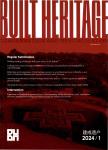The development and institutional characteristics of China's built heritage conservation legislation
作者机构:College of Architecture and Urban PlanningTongji University1239 Siping RoadYangpu DistrictShanghai 200092China
出 版 物:《Built Heritage》 (建成遗产(英文))
年 卷 期:2022年第6卷第1期
页 面:4-18页
核心收录:
学科分类:05[文学] 0503[文学-新闻传播学]
基 金:National Natural Science Foundation。
主 题:Conservation legislative history Built heritage Historic and cultural cities Chinese conservation policies
摘 要:The article reviews comprehensively the emergence and development of China s national legislative system for cultural heritage,with a particular focus on built heritage.It covers the period from the late Qing Dynasty to the present.The antiquity preservation legislation and policies from the late Qing Dynasty to the early Republic of China(ROC)era signify the initial emergence of the state-led legislative system for cultural heritage protection and management.The Interim Regulations on the Conservation and Management of Cultural Heritage,passed in 196o,represent the state s first targeted effort to protect significant historic monuments and sites.The 1982 Cultural Heritage Protection Law(CHPL)established the mechanism for the conservation of Protected Cultural Heritage Sites(PCHS),while the 2008 Regulation on the Conservation of Famous Historic and Cultural Cities,Towns and Villages(RCFHCCTV)defined the principles for the conservation and management of historic cities.China s current jurisdiction for the conservation of cultural heritage is underpinned by legislation such as the CHPL,the Intangible Cultural Heritage Law(ICHL),and the RCFHCCTV.This article analyses the characteristics of the current state legislative system for built heritage conservation and the challenges and constraints regarding urban conservation.It concludes with strategic guidance for improving the legislation for China s built heritage conservation in the present era of rapid economic development and urban regeneration.



